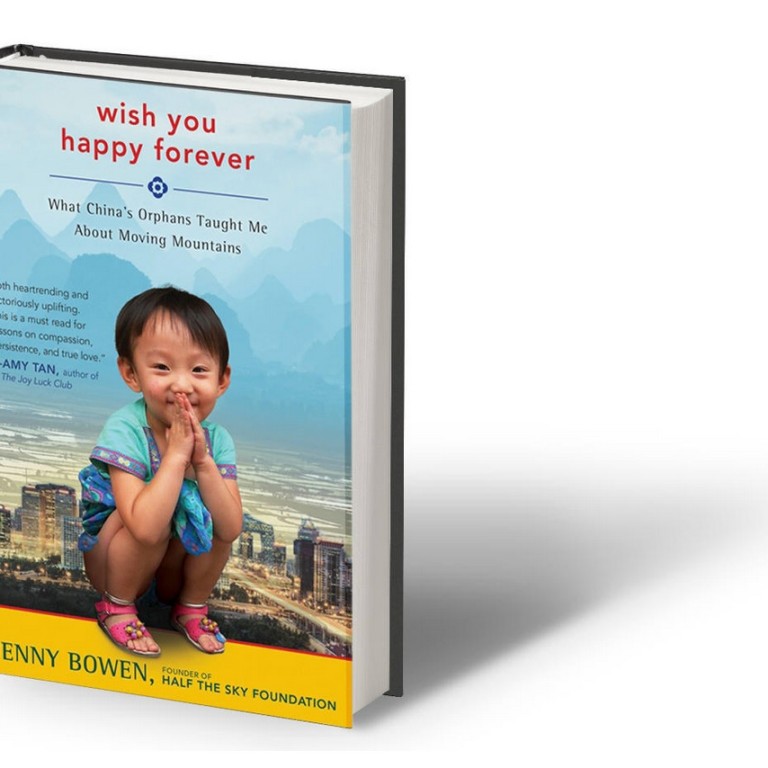
Memoir chronicles voyage of self-discovery by saviour of abandoned orphans
Early one morning in Los Angeles in 1996, filmmaker Jenny Bowen came across a article headlined "US rights group asserts China lets thousands of orphans die". An account of China's state-run orphanages, the article featured a photograph of a thin, tiny girl with sunken cheeks. Moments later, Bowen had an experience she sums up as "instant knowing" - a feeling that "this is what I'm meant to be doing and that my daughter is somewhere waiting for me". Bowen, who already had a son and daughter in their 30s, went on to adopt two orphaned Chinese girls and established Half the Sky, a non-profit foundation that helps build infant centres and preschools across China devoted to giving children individual attention. The foundation's work has been so successful it is the only non-governmental group to participate in China's national child welfare programme. Bowen's journey from being a cog in the wheel of Hollywood to the only American selected to run in China with the torch during the 2008 Beijing Olympics is the subject of her memoir, . Bowen talks about her book with .
I wrote a draft based on a story I'd been carrying in my heart. My editor said he loved the story, but didn't feel it had enough of me in it. So I had to go back and look at places in my life. The "me" came out in very unexpected ways. I learnt why I do what I do. I never thought about what it is in me that's pushing me to help these kids find love. I didn't receive enough love as a child. And that started coming out.
Nothing frightened me about writing the memoir. I wanted to be truthful and conscious. But I was also sensitive to possible repercussions within China - to tell the truth but tell it responsibly and in a sensitive manner. When there were people or places I was concerned about I just changed names and characteristics.
It's impossible to tell. I'm sitting in the US and writing about people in China. Even China's best intentions are misinterpreted in the West. I feel I want to protect them as much as anything. The Chinese government has made possible what I do in China. If they didn't want it, there are many ways they could have shut it down.
Dramatically. It's almost like China has entered the First World. It has happened in Korea. The feeling that their children must be sent away to other countries for their own good is not a good feeling. They are really now doing the best they can do. But there are many, many miles to go.
Every single thing I've learnt, I've learnt from the children. They've taught me. These children are such survivors. It's not just that they get by from day to day. They have a depth that kids who grow up in privilege never acquire. We try to bring the love of family to children. The bond and attachment that comes through family relationships is essential. It all revolves around what we call "responsive care". Each child is treated as an individual and we respond to the needs of that individual child. This happens from the time the child is a tiny baby to when he or she is an adult. Teachers work with them and watch what the children are interested in.
In the beginning I felt a combination of anger and an overwhelming desire to sweep all the children up and get them out of there. I had to keep a smile on my face and just walk through. Now, I can walk into a place and say, I know what we can do for you kids and really fast.
There was a little girl, Jing Li, who had spina bifida. She wasn't bathed and was incontinent. But she had this amazing fire in her eyes. I walked into this dark place and her eyes were just glowing. I was so moved. I arranged for her to get surgery in Shanghai. When she arrived in Beijing, with the orphanage director's wife, I asked how she was doing in school. And the director's wife replied that she had graduated from elementary school but the community schools won't accept her because of her handicap. And I looked at my husband and said, "We're not sending this girl back, we're not sending her there ever again." And they agreed with us. She lived with us in Beijing for nine months. We got tutors for her and got a family in the US midwest to adopt her. She's 18 years old and is now my friend on Facebook.
The first lesson is that the most basic human need is to love and be loved. The second is that the children have given me a kind of strength to persevere. Nobody is more patient than children in institutions who are waiting for their lives to start. I learnt, too, that if you wait for things to start you will never get anywhere.
